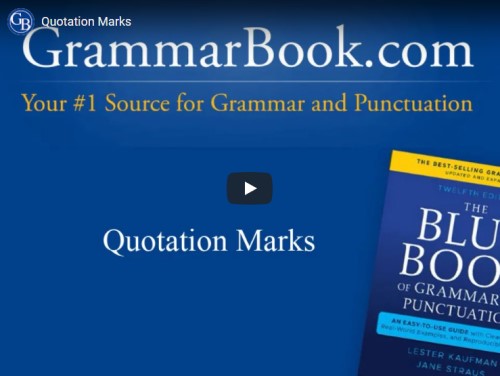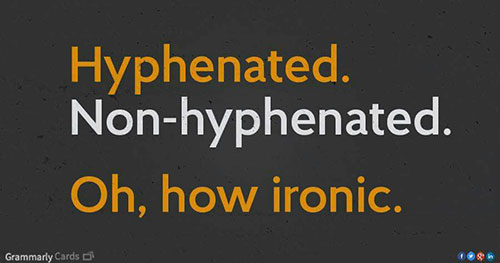|
The proper use of good and well in writing is a common
grammatical topic. For many, the distinction can be uncertain.
An equally slippery subject is whether to hyphenate well when it helps describe a noun. For example, do we write a well-dressed man or a well dressed man?
Because well here is an adverb that modifies dressed, some might say not to punctuate the compound description; this would align with the guideline that omits punctuation from adverbial modifiers ending in -ly: a thoroughly informed spokesperson. Some might also believe that only compounded adjectives would be hyphenated: bluish-green eyes.
As a general rule, a compound adjective can include an adverb. The compound is often hyphenated before a noun but not after a noun (a well-dressed man, the man is well dressed). Well also would not be hyphenated when compounded with other adverbial modifiers, such as very (a very well dressed man).
At the same time, further investigation reveals that not all style authorities agree on this subject. The Associated Press Stylebook advises us to hyphenate well in a compound modifier both when it precedes a noun and when the compound follows the verb to be: a well-dressed man, the man is well-dressed.
AP’s rationale is that retaining the hyphen in compound modifiers after the noun helps avoid confusion. For example, if the hyphen is omitted in a statement such as he is a little known man, the reader might interpret it as meaning he is a known man who is little. Adding the hyphen clarifies: little-known man tells us he is one few people know. Writing the man is well-dressed remains consistent with AP’s chosen style.
The Chicago Manual of Style, on the other hand, doesn’t concur with this stance. Its editors find hyphenation unnecessary when a compound modifier with well follows a noun, including compounds that might be hyphenated in dictionaries. It would therefore encourage us to write the man is well dressed.
Other style hawks assert that certain compounds with well should retain their hyphens in all positions because they are single concepts or standard expressions. These individuals would cite examples such as well-appointed, well-founded, well-connected, and well-intentioned; to them, each compound’s meaning differs from its unmodified adjective (appointed, founded, connected, intentioned), making well vital to clarity.
By this reasoning, these compound concepts or expressions would retain their hyphen even when well is modified by another adverb such as very: a very well-appointed man.
With all this considered, we still might ask ourselves: When do we truly need to hyphenate? The experts don’t agree and even seemingly reliable guidelines can have exceptions. The answer is that rules of hyphenation for well are not engraved in stone.
As with anything else in our writing, clarity is king. If a hyphen makes our meanings clearer, we keep it; otherwise, we leave it out as nonessential. Consistency matters as well. As long as we choose a style and stick to it, our usage will help sustain our writing rather than distract from it.
|
View and comment on this
article on our website.
|
|
|

|
Pop Quiz
Choose the correct treatment according to the general rule of hyphenating well described in the article.
1. With her connections, she has become a (very well-known / very well known) businessperson in the community.
2. I find him (well versed / well-versed) in Shakespearean drama.
3. She is always (well prepared / well-prepared) for her meetings.
4. Their (well-behaved / well behaved) children are good company whenever they visit.
|
 |
The Blue Book of Grammar and Punctuation
by Lester Kaufman and Jane Straus |
The Authority on English Grammar! Twelfth Edition Now Available
An indispensable tool for busy professionals, teachers, students, homeschool families, editors, writers, and proofreaders.
Available in print AND as an e-Book! Over 2,000 copies are purchased every month!
To order the book, simply click the link to order the book from the GrammarBook.com website.
|
Free BONUS Quiz for You!
[[firstname]], because you are a subscriber to the newsletter, you get access to one of the Subscribers-Only Quizzes. Click here to take a Confusing Words and Homonyms Quiz and get your scores and explanations instantly!
We will be adding many more quizzes this year to our already substantial list of them. If you have suggestions for topics we have not yet covered, please send us a message at help@grammarbook.com.
|
Hundreds of Additional Quizzes
at Your Fingertips
Subscribe now to receive hundreds of additional English usage quizzes not found anywhere else!
Teachers and Employers
Save hours of valuable time! You may assign quizzes to your students and employees and have their scores tallied, organized, and reported to you! Let GrammarBook.com take the hassle out of teaching English!
"Fun to test my skills."
"The explanations really help ... thanks!"
"I can select the quizzes to assign to my students, and then the results are reported to me automatically!"
If you think you have found an error in a quiz, please email us at help@grammarbook.com
|
Wordplay

Pop Quiz Answers
1. With her connections, she has become a (very well-known / very well known) businessperson in the community.
2. I find him (well versed / well-versed) in Shakespearean drama.
3. She always comes (well prepared / well-prepared) for her meetings.
4. Their (well-behaved / well behaved) children are good company whenever they visit.
|
 |
English In A Snap:
68 One-Minute English Usage Videos FREE |
Learn all about who and whom, affect and effect, subjects and verbs, adjectives and adverbs, commas, semicolons, quotation marks, and much more by just sitting back and enjoying these easy-to-follow lessons. Share them with your colleagues (and boss), children, teachers, and friends as well! Click here to watch.
|
|





